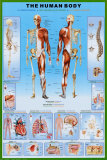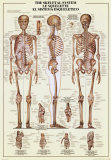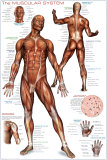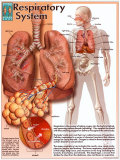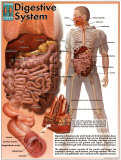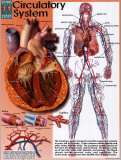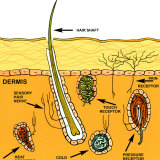|
|
Anatomy & Physiology Posters, Art Prints & Charts Index
for the science and anatomy classrooms, home schoolers, and health professionals offices.
|
science > biology > ANATOMY & PHYSIOLOGY 1 | 2 < health < social studies
|
|
Educational posters to study anatomy and physiology of the human body, the skeletal, muscular, circulatory, respiratory, digestive, reproductive, nervous, endocrine, and lymphatic systems, the senses, hair and teeth.
The word anatomy is from the Greek anatomia, to cut up, to cut open. Anatomy is a branch of biology dealing with the organization and structure of living beings.
• “We know that our senses are subject of decay, that from our middle years they are decaying all the time; but happily it is as if we didn't know and didn't care.” ~ William Henry Hudson
• “A writer should write with his eyes and a painter paint with his ears.” ~ Gertrude Stein
|
|
Dimensional Man/Life-Size Pop-Up Figure
Six feet tall, half skeletal, half muscular life-size pop-up figure revealing the cardiovascular, respiratory, digestive, locomotor and urogenitary systems of the body; comes with an index identifying 304 bones, muscles, organs, arteries and veins.
|
|
|
|
The Incredible Human Body; Great Projects and Activities and Two Posters that Teach About the Major Body Systems
|
|
|
|
Human Body
Le Corps Human
Der Menschliche Korper
El Cuerpo Humano
|
|
|
|
Human Anatomy Chart Pack
8 illustrated charts explores the basics of human anatomy - digestive, ear, eye, anatomy, nervous, respiratory, vascular, muscular-skeletal.
|
|
|
|
Skeletal System Posters
Humans have an internal skeleton made up ossified tissue called bones, supplemented by ligaments, tendons, cartilage, and moved by muscles.
|
|
|
|
Muscular System Posters
Muscles produce force and action, for both voluntary locomotion externally, and involuntary like the contractions of a beating heart.
|
|
|
|
Nervous System Posters
The brain and spinal cord make up the central nervous system. The peripheral nervous system is made up of the sensory and motor nerves conneting the brain and spinal cord to the sense organs, glands, muscles, and the rest of the body.
|
|
|
|
Respiratory System Posters
The upper respiratory tract includes the mouth, nose, nasal cavity, pharynx, larynx and trachea. The lower respiratory tract consists of the lungs, lung tissue, and structures in the lung (bronchi, bronhioles and alveoli). The diaphragm also aids in breathing.
|
|
|
|
Digestive System Posters
The digestive system consists of the mouth, throat, the esophagus, stomach, small intestine and the large intestine. The liver, pancreas and gallbladder also contribute to the digestive process.
|
|
|
|
|
|
|
Overview of Five Senses
One thing all senses share is that when they detect something, they translate it into a common form–the nerve signal, which travels along sensory nerves to the brain. These nerve messages are the body's “language.” Sense organs transform stimuli (such as sound waves, light rays, flavors, odors, or physical contact) into electrical nerve signals, which are instantly flashed to the brain for interpretation and identification.
• Sight • Hearing • Taste • Smell • Touch
• Sense System poster series
|
|
|
|
 Endocrine & Lymphatic Systems Charts Endocrine & Lymphatic Systems Charts
The endocrine system comprises the glands and certain tissues that secrete hormones, the ‘messengers’ that are released into the blood to travel to distant tissues and organs and elicit specific functions necessary for the organism.
The lymphatic system comprises bone marrow, spleen, thymus, lymph nodes, and lymphatic vessels that produce, store and carry white blood cells the fight infections and disease.
|
|
|
|
|
|
|
Skin - Touch Sensory Nerves
The skin is the body's largest organ. In an adult it weighs anywhere from six to ten pounds and measures as much as twenty square feet. Inside the dermis there are millions of microscopic receptors that tell us if something is hot or cold, heavy or light, rough or smooth. The dermis is really where the sense of touch takes place.
The skin contains a variety of nerve endings that detect touch, pressure, cold , heat, or pain. The nerve endings convert sensations into electrical impulses that are then sent to the brain.
When the skin is damaged, cells release chemicals. These activate nerve endings that detect pain.
The first touch receptors appear in the fetus by ten weeks. Neural connections are made in the third trimester.
|
|
|
|
The Human Hair
Shows detailed anatomical view of hair within the skin and of the hair shaft. Illustrates types of scalp hair and hair fiber characteristics. Shows miniaturization of hair follicles in baldness and also the hair-growth cycle.
|
|
previous page | top | ANATOMY & PHYSIOLOGY 1 > pg 2
|
|
I have searched the web for visual, text, and manipulative curriculum support materials - teaching posters, art prints, maps, charts, calendars, books and educational toys featuring famous people, places and events - to help teachers optimize their valuable time and budget.
Browsing the subject areas at NetPosterWorks.com is a learning experience where educators can plan context rich environments while comparing prices, special discounts, framing options and shipping from educational resources.
Thank you for starting your search for inspirational, motivational, and educational posters and learning materials at NetPosterWorks.com. If you need help please contact us.
|
|
|













